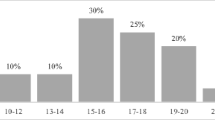Abstract
Human trafficking for criminal exploitation is one of the lesser-known forms of human trafficking. The failure of the criminal justice system to identify the victims of this type of trafficking can lead to a failure to take the victim-centred approach to trafficking espoused in the international legal instruments that regulate the matter, an approach that emphasises the protection of victims and respect for their rights. In light of earlier findings of the existence of unidentified victims of human trafficking for criminal exploitation in several European countries — the UK, Ireland, Spain, the Czech Republic and the Netherlands — a qualitative study was conducted, consisting of 37 in-depth interviews with practising criminal justice professionals and victim service providers in Spain. Because undetected victims of human trafficking for criminal exploitation are usually treated as offenders, the main aim of this research with professionals was to determine the causes of the criminal justice system’s failure to identify the victims of this specific form of trafficking in order to prevent them from remaining hidden victims.
Similar content being viewed by others
Notes
The RACE in Europe was a project focused on research on trafficking for criminal exploitation and forced begging founded by the European Commission-Directorate-General Home Affairs. It was carried out during 2013 and 2014 in UK, Ireland, The Netherlands and The Czech Republic by eight partners located in this four countries. As well as a good practices guide to help front line professionals to identify victims of this type of trafficking, part of the project team (Anti-Slavery International, ECPAT UK and The Specialist Policing Consultancy in UK, The Migrant Rights Centre Ireland and La Strada Czech Republic) completed an explanatory study to determine its scope and scale in the four countries taking part in the project.
According to which individuals tend to apply schemes they have internalised from prior experiences to identify and manage new situations (Farrell et al. 2015).
References
Atak, I., & Simeon, J. C. (2014). Human trafficking: Mapping the legal boundaries of international refugee law and criminal justice. Journal of International Criminal Justice. doi:10.1093/jicj/mqu093.
Braun, V., & Clarke, V. (2006). Using thematic analysis in psychology. Qualitative Research in Psychology, 3(2), 77–101.
Corbin, J., & Strauss, A. (2008). Basics of qualitative research. Thousand Oaks: Sage Publications.
Decker, S. H. (2015). Introduction. Human trafficking: Contexts and connections to conventional crime. Journal of Crime and Justice. doi:10.1080/0735648X.2015.1039792.
Denzin, N. K., & Lincoln, Y. S. (2002). Introduction: The discipline and practice of qualitative research. In N. K. Denzin & Y. S. Lincoln (Eds.), The Sage handbook of qualitative research (pp. 1–41). Thousand Oaks: Sage.
Eurostat-European Commission (2013). Trafficking in human beings. Report. https://ec.europa.eu/anti-trafficking/sites/antitrafficking/files/trafficking_in_human_beings_-_dghome-eurostat_en_1.pdf. Accessed 15 December 2016.
Eurostat-European Commission (2015). Trafficking in human beings. Report. https://ec.europa.eu/anti-trafficking/publications/trafficking-human-beings-eurostat-2015-edition_en. Accessed 15 December 2016.
Farrell, A. (2014). Environmental and institutional influences on police agency responses to human trafficking. Police Quarterly. doi:10.1177/1098611113495050.
Farrell, A., Owens, C., & McDevitt, J. (2014). New laws but few cases: Understanding the challenges to the investigation and prosecution of human trafficking cases. Crime, Law and Social Change. doi:10.1007/s10611-013-9442-1.
Farrell, A., & Pfeffer, R. (2014). Policing human trafficking: Cultural blinders and organizational barriers. The Annals of the American Academy of Political and Social Science, 653, 46–64.
Farrell, A., Pfeffer, R., & Bright, K. (2015). Police perceptions of human trafficking. Journal of Crime and Justice. doi:10.1080/0735648X.2014.995412.
Guest, G., MacQueen, K. M., & Namey, E. E. (2012). Applied thematic analysis. Thousand Oaks: Sage.
Hales, L., & Gelsthorpe, L. (2012). The criminalisation of migrant women. Cambridge: Institute of Criminology, University of Cambridge.
ILO (2012). ILO global estimate of Forced Labour. Results and Methodology. Report. http://www.ilo.org/global/topics/forced-labour/publications/WCMS_182004/lang--en/index.htm. Accessed 21 December 2016.
Kaye, J., Winterdyk, J., & Quarterman, L. (2014). Beyond criminal justice: A case study of responding to human trafficking in Canada. Canadian Journal of Criminology and Criminal Justice. doi:10.3138/cjccj.2012.E33.
Lincoln, Y. S. (2002). Institutional review boards and methodological conservatism. The challenge to and from phenomenological paradigms. In N. K. Denzin & Y. S. Lincoln (Eds.), The Sage handbook of qualitative research (pp. 165–181). Thousand Oaks: Sage.
Marshall, C., & Rossman, G. B. (2006). Designing qualitative research. Thousand Oaks: Sage.
May, K. A. (2005). Conocimiento abstracto: un caso a favor de la magia en el método. In J. M. Morse (Ed.), Asuntos críticos en los métodos de investigación cualitativa. Alicante: Publicaciones Universidad de Alicante.
OSCE-Office of the Special Representative and Co-ordinator for Combating Trafficking in Human Beings (2013). Policy and Legislative recommendations towards the effective implementation of the non-punishment provision with regard to victims of trafficking. Report. http://www.osce.org/secretariat/101002?download=true. Accessed 21 December 2016.
RACE (2014). Trafficking for forced criminal activities and begging in Europe: Exploratory study and good practice examples. Report. http://www.antislavery.org/includes/documents/cm_docs/2014/t/trafficking_for_forced_criminal_activities_and_begging_in_europe.pdf. Accessed 15 December 2016.
Renzetti, C. M., Bush, A., Castellanos, M., & Hunt, G. (2015). Does training make a difference? An evaluation of a specialized human trafficking training module for law enforcement officers. Journal of Crime and Justice. doi:10.1080/0735648X.2014.997913.
UNODC (2009). Global report on trafficking in persons. Report. https://www.unodc.org/unodc/en/human-trafficking/publications.html#Reports. Accessed 21 December 2016.
UNODC (2012). Global report on trafficking in persons. Report. https://www.unodc.org/unodc/en/human-trafficking/publications.html#Reports. Accessed 21 December 2016.
UNODC (2014). Global report on trafficking in persons. Report. https://www.unodc.org/unodc/en/human-trafficking/publications.html#Reports. Accessed 15 December 2016.
Villacampa, C., & Torres, N. (2014). Trafficked women in prison: The problem of double victimisation. European Journal on Criminal Policy and Research. doi:10.1007/s10610-014-9240-z.
Warria, A., Nel, H., & Triegaardt, J. (2015). Challenges in identification of child victims of transnational trafficking. Practice: Social Work in Action. doi:10.1080/09503153.2015.1039974.
Acknowledgements
This research was carried out under the project DER 2015-64506-C2-1-R, funded by the Spanish Ministry of Economy and Competitiveness.
Author information
Authors and Affiliations
Corresponding author
Rights and permissions
About this article
Cite this article
Villacampa, C., Torres, N. Human Trafficking for Criminal Exploitation: The Failure to Identify Victims. Eur J Crim Policy Res 23, 393–408 (2017). https://doi.org/10.1007/s10610-017-9343-4
Published:
Issue Date:
DOI: https://doi.org/10.1007/s10610-017-9343-4




